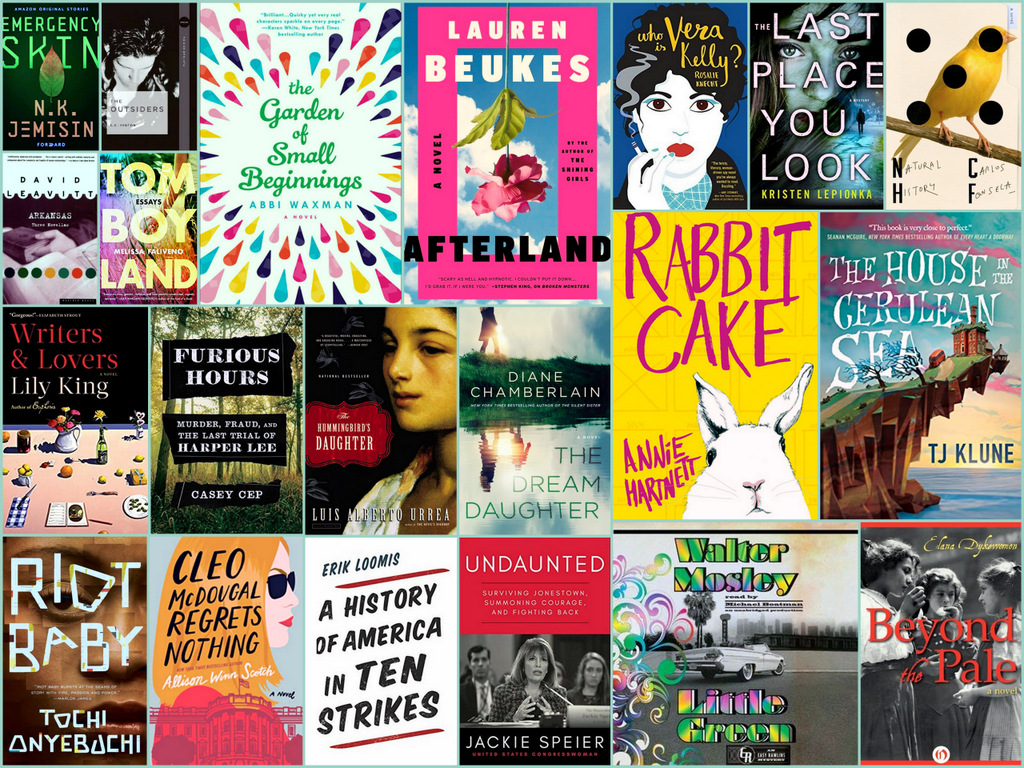“Well, you know what they say. Trauma is the best salsa.”
~ Abbi Waxman, The Garden of Small Beginnings
I’m gonna read 100 books this year.
I’ve always been a reader. I was an English major, for Pete’s sake, have cherished the epithet like a, well, epithet. But since I tested positive in early May (asymptomatic may be my all-time favorite word), I’ve been reading like I’d hoped retirement reading to be.
I read through all the $1.99 books I’ve been stockpiling in the Kindle app on my phone, read the best of the free e-books I’ve been amassing, read books I bought months, some years, ago, finally getting to my massive TBR pile. I’ve sorted through my physical books, put aside a full supermarket bag full to give away to a good home (you know what that feels like) and am accepting that an additional bookcase may be in order, perhaps a small one for the corner.
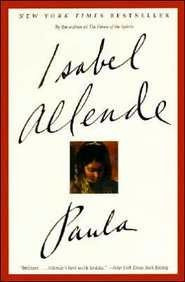
In the years since my son Matthew was murdered, three books have lingered at the top of my favorites list: Paula by Isabel Allende, The Year of Magical Thinking by Joan Didion, and The Art of Racing in the Rain by Garth Stein. Hard to miss the pattern, huh?
And so, mid-pandemic, the book at the top of my very favorite books has changed, for the first time in 10 years. The new one is joyous and uplifting and so-wonderfully optimistic.
“When local author TJ Klune finished his book ‘The House in the Cerulean Sea,’ he knew he had something special — ‘which doesn’t always happen,’ Klune said.
‘It left me with a happy sign,’ he said. ‘And I think we need that now, more than ever.’
Klune said he believes the country is ‘on a precipice,’ with acceptance and love on one side and fear on the other, and he hopes his work can help shift the balance toward love.
As people start to hunker down at home to stop the spread of coronavirus, Klune suggested that it’s a good time to read a book.
‘If you’re looking for something to read that will make you feel good, ‘The House in the Cerulean Sea’ is the book. It’s a slice of happiness.’”
Colleen Mondor wrote the other best review: “I’m not going to lie, my long dormant raised-a-good-little-Catholic self almost regards this turn of events as a divine act by a book-loving god. For all the right reasons, because it is smart and sincere and brilliantly romantic, The House in the Cerulean Sea is most certainly, as author Seanan McGuire blurbed it, ‘very close to perfect.’ This is the book we all need to be reading right now; this is the one that makes so many things much better.”
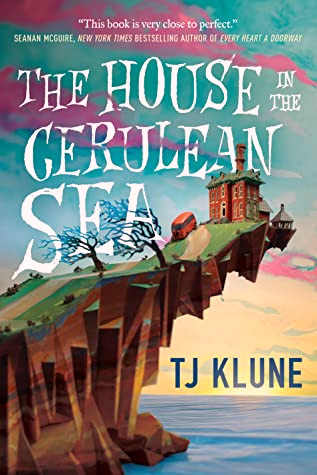
“The House in the Cerulean Seais about a group of magic-filled children who defy convention. (I cannot tell you how, but trust me – they are fabulous characters!) It is about two endearingly brave and kind men who stumble forward into friendship and gentle love. Finally, it is about the false promise of blind faith in authority and the courage it takes to challenge that promise. But mostly, it is proof that such precious books as this can still exist and still succeed and are still, very much, needed. Do not discount what TJ Klune has done with this novel, and do not ignore importance of this marvelous treasure he has unearthed for us all.”
I highlighted pretty much the whole book. Some highlights of my highlights:
“The things we fear the most are often the things we should fear the least. It’s irrational, but it’s what makes us human. And if we’re able to conquer those fears, then there is nothing we’re not capable of.”
“’And yet, here you are by the sea, far from your chair and home.’ She stopped and turned her face toward the sky. ‘There’s music everywhere, Mr. Baker. You just have to learn to listen for it.’”
“It’s not only this village, Mr. Baker. Just because you don’t experience prejudice in your everyday doesn’t stop it from existing for the rest of us.”
“Linus flushed and looked away. He was suddenly very warm. A warm, round egg with pale limbs.”
“’Do you like girls, Mr. Baker? Or boys? Or both?’ The children turned their heads slowly to stare at him. ‘I like everyone,’ Linus managed to say. ‘Boring,’ Talia muttered. ‘I’m a boy!’ Chauncey exclaimed. He frowned. ‘I think.’ ‘You are whoever you want to be,’ Arthur told him, patting him between the eyes.”
“’That there’s so much hope even when it doesn’t seem like it.’ He was gobsmacked. ‘How do you mean?’ “The little girl. She wasn’t scared of me. She was nice. She didn’t care what I looked like. That means she can make up her own mind.’”
“’It’s not fair,’ Linus said, staring off into nothing. ‘The way some people can be. But as long as you remember to be just and kind like I know you are, what those people think won’t matter in the long run. Hate is loud, but I think you’ll learn it’s because it’s only a few people shouting, desperate to be heard. You might not ever be able to change their minds, but so long as you remember you’re not alone, you will overcome.’”
“Sunlight filtered through the trees, and Zoe was telling Phee that it wasn’t just about what she could grow, but about cultivating what was already there. ‘It’s not always about creation,’ Zoe said quietly as flowers bloomed underneath her hands. ‘It’s about the love and care you put into the earth. It’s intent. It’ll know your intentions, and, if they’re good and pure, there is nothing you won’t be able to do.’”
“It’s the little things, I expect. Little treasures we find without knowing their origin. And they come when we least expect them. It’s beautiful, when you think about it.”
“Regardless of what else he is, he is still a child, as they all are. And don’t all children deserve to be protected? To be loved and nurtured so that they may grow and shape the world to make it a better place? In that way, they are no different than any other child in the village, or beyond. But they’re told they are, by people such as yourselves, and people who govern them and our world. People who put rules and restrictions in place to keep them separated and isolated. I don’t know what it will take to change that, if anything. But it won’t start at the top. It’ll start with us.”
Wow. Right?
I’ve loved some other books since mid-March.
Colleen from my book club recommended The Hummingbird’s Daughter by Luis Alberto Urrea months ago. I pretty much love everything she suggests.
“God is a worker, like us,” Huila, an aged curandera, instructs the young Teresita. “He made the world — he didn’t hire poor Indios to build it for him! God has worker’s hands. Just remember — angels carry no harps. Angels carry hammers.”
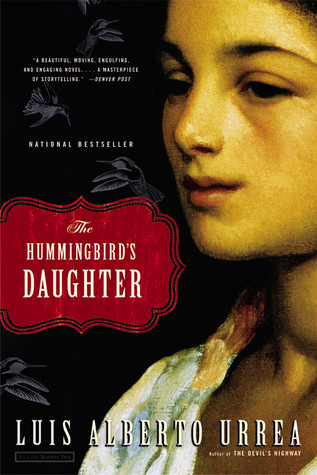
‘The Hummingbird’s Daughter’: A Saint With Grit
“I dreamed of a hummingbird made of sky.”
“The honeysuckle made the People particularly happy, since it attracted holy hummingbirds, and as long as hummingbirds hovered nearby, things would be all right.”
“Tomás rode his wicked black stallion through the frosting of starlight that turned his ranch blue and pale gray, as if powdered sugar had blown off the sky and sifted over the mangoes and mesquites.”
“The Sinaloans had heard that the Sonorans indulged in the unspeakable atrocity of eating flour tortillas. Flour! Any human being knew that tortillas were made of corn.”
“Still. We are both man and woman. My brothers can be tender as mothers with their infants. Women can fight like tigers. Do you see? We are all a mix of each. Power starts when you strike the proper balance. Believe me when I tell you that the woman part of you is the better part. But you are also a man.”
“She learned that women were braver than men. Braver and stronger. She learned that she herself could one day stretch open as wide as a window, and it would not kill her.”
Reading Urrea’s family “history” felt like traveling along with him, through that history. I loved all the women. And some of the men.
For reasons obvious and less, Beyond the Pale hit me in some of the same feels.
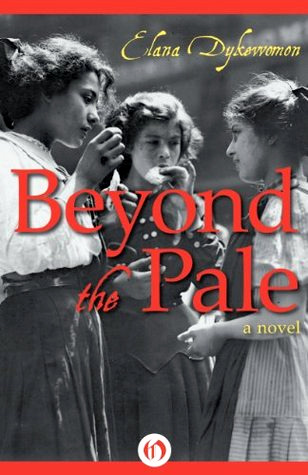
I had no idea. And these are my people. I didn’t understand the meaning of the expression “beyond the pale.” We were from outside Kyiv (and Odessa and Moscow) because we weren’t allowed inside them. Now that is beyond the pale!
“THE PALE. The Pale of Settlement, the large area in western Russia to which Jews were restricted from 1791 to 1917. Jews were also forbidden to enter the ‘holy cities’ of Kiev and Moscow within the Pale. Its boundaries changed according to the liberalism or anti-Semitism of the tsars.”
“Catherine the Great created the Pale of Settlement in Russia in 1791. This was the name given to the western border region of the country, in which Jews were allowed to live. The motivation behind this was to restrict trade between Jews and native Russians. Some Jews were allowed to live, as a concession, ‘beyond the pale.’
Pales were enforced in various other European countries for similar political reasons, notably in Ireland (the Pale of Dublin) and France (the Pale of Calais, which was formed as early as 1360).”
“Tsar Alexander II was assassinated, and suffering was the air in our lungs. The uprooted filled the streets of Kishinev for more than ten years. Many families even had to borrow coal in winter in order to boil water for the newborn. Pogroms raged throughout the Pale—one year of misery, then maybe a little break; families moving from one town to another; then a famine in the north and more homeless. Tsar Alexander III enforced the May Laws; more Jews got thrown off their land, out of their shtetls. We got used to so many poor in the streets, living on less and less. There was a little calm, then a depression, and the Tsar took it into his mind to expel all the Jews from Saint Petersburg and Moscow. They arrived here chained together like criminals, doctors and businessmen.”
But this is primarily a book about the women. Their love. And the work.
“Whenever you tell the story of one woman, inside is another.”
“’Organizing? Very good, very good. What kind of organizing?’ ‘How many kinds are there?’”
“My generation did not spring full-blown from the intellectual head of 1960s civil rights and anti-war movements, as is often claimed (and as important as those movements were to our moral development). We are the bodies of hope, of women’s possibility. We are resilient, coming to life generation after generation, because the ways we love each other, the ways we love life, are impossible to repress for long. We are literally re-generation.”
“What Rose loved, really—she looked up, noticing the pink clouds paling to gray—was their excitement. If Chava had, instead, a passion, a genuine fever, for buying property, Rose would have loved her for that. (Maybe—it was hard to picture either of them as landladies!) Ardent. That’s what Chava was, ardent. Her need to change the world, that was what swept Rose into her.”
“You asked me, I’ll tell you. The day I started talking rent strike to the neighbors was the best day of my New York life.”
I love that the author changed her name to Elana Dykewomon to make sure there was no misunderstanding (“at once an expression of her strong commitment to the lesbian community and a way to keep herself ‘honest,’ since anyone reading the book would know the author was a lesbian”).
Yet, I’ll always have a soft spot for a good read that gets grief. It’s really my favorite genre.
Rabbit Cake by Annie Hartnett is one.
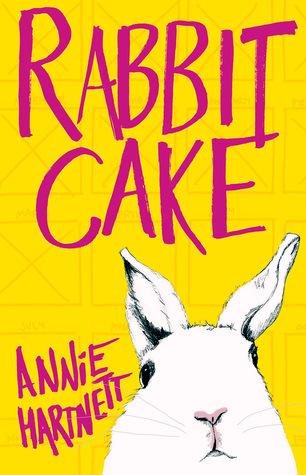
“Boomer died of old age, but I’d figured out by now that death never makes sense, no matter how someone dies: murder, accident, old age, cancer, suicide, you’re never ready to lose someone you love. I decided death will always feel unexplained; we will never be ready for it, and you just have to do the best you can with what you have left.”
And lo and behold (I’ve always wanted to write that), this one: The Garden of Small Beginnings by Abbi Waxman.
Grief and gardening. In Los Angeles. With attitude.
Q: What makes this book so special is your narrator Lili’s irreverent and funny voice. Why did you choose gardening as a vehicle for her story?
A: Because I suck at it, which makes it interesting. I made her better looking than me, too, and her house is cuter. This is what’s appealing about being a writer: mind-boggling, all-encompassing power.
See what I mean?
I noted 65 highlights while I was reading this book. 65. I pretty much highlighted the whole book.
Between each chapter, we get great funny very specific gardening advice. I’d read this book for these alone.
ON GARDENING
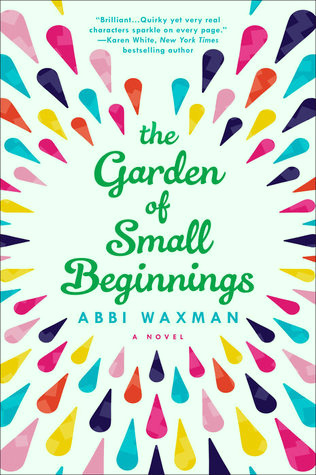
Remember, one pot on a balcony is still a garden.
Gardeners love to grow other gardeners.
‘While you’re at it, look up the term potager, which is the type of garden we are creating. Basically, it means a garden in which vegetables, flowers, and herbs are grown together, making it efficient.’ He frowned at himself. ‘I’m sorry, I have a tendency to lecture. I find the whole subject of gardening fascinating.‘
Stick your tomato plant in the ground and admire it: Tomatoes are susceptible to compliments.
Try and keep the soil moist. Broccoli needs to be kept moist. However, do not get developing heads wet when watering. They will come to life and terrorize the neighborhood. That’s not true, but they won’t like it.
. . . . measure for this stuff, just eyeball it. They’re not going to get pissy and refuse to grow just because you’re an inch out. Unless you plant those fancy multicolored carrots; they take that shit really seriously.
Beans need supports to grow on, but you can use a lot of different things: Fence panels, bamboo stakes, strings, wool you tie across the garden area, your ex-husband’s golf clubs. Whatever works.
You need a spot with lots of room and plenty of sun. And so do pumpkins.
If your first flowers aren’t forming fruits, that’s normal. Both male and female blossoms need to open, get to know one another, maybe hang out and watch a movie and, just, you know, chill.
But sometimes that’s just what happens, right? Like one day it’s winter and everything is brown, and two days later it’s spring and everything is bursting into bud and flower all at once. Once nature gets an idea in her head, she tends to run with it, no?
‘That’s the nice thing about gardening: It’s never done.’ Rachel turned to me. ‘Or it’s the maddening, frustrating, soul-destroying part of gardening, that it’s never done. Either way.’
Zucchini need full sun, moist, well-drained soil, and lots of verbal encouragement.
If you do not have enough bees, you can manually pollinate with a Q-tip. Awkward.
Harden off seedlings by keeping them outdoors for a couple hours a day and speaking to them harshly.
If celery does not get enough water the stalks will be dry and small, and it will be no one’s fault but your own.
Believe it or not, sprinkling wood ashes on the soil before planting peas is helpful. To the peas, that is.
They’re high in vitamins and minerals, low in sugar, and taste delicious roasted, caramelized, or mashed with a pound of butter. Pliny the Elder considered the turnip the most important vegetable of his day, because ‘its utility surpasses that of any other plant’s.’ Say what you want about Pliny the Elder . . . he was a man who knew his vegetables.
I hadn’t expected vegetables to become such a major feature of my life, but that’s the thing with plants . . . they grow to fill the available space.
ON EVERYTHING ELSE
I caught sight of my reflection in the kitchen window and for a minute thought I was my mother. Fantastic.
I had imagined an old dude in clogs rolling a huge wheel of Edam, but this guy was tall, about my age, and looked friendly enough. No cheese.
Clare chimed in, ‘Plus, she doesn’t have anyone to play with since Daddy died.‘
It struck me that ‘Mommy, what’s the Black Death?’ was in my future.
I bitterly regretted wasting time arguing with him. If I could exchange the time I spent picking up socks and complaining for one more kiss, or even for five minutes of sitting together silently, drinking coffee in the living room, I would do it in an eyeblink.
The sun was warm, the kids were engaged, and there was something nice about sitting in the earth, just breaking up lumps. I felt . . . what’s that word . . . happy.
‘I think it must be you, to be honest. In what fantasyland did you think manual labor would be easy? Doesn’t the phrase manual labor kind of give it away? If they called it manual vacation or manual relaxation, then I could see where you might get confused.‘
For the first time in recent years I was going to stop thinking and just dig in the dirt.
(This was before the kids, obviously, although people do strip paint and sand floors with children underfoot, hard though it is to imagine. I would always be tempted to wall one of them up when no one was looking.)
I stood there like a mushroom, a young and beautiful mushroom, but a mushroom nonetheless.
I gazed at him, the tinkling sound in my head the shattered pieces of my assumptions hitting the ground.
How hard can it be? And then it happens, and the first three months are like Vietnam without the drugs. Grief is like that, but really an enormous amount worse. Vietnam without drugs, weapons, or the outer layers of your skin.
‘For whom he left me, I should say.’ Maggie was a professor of English Literature. I think it physically hurt her to split an infinitive.
And with that final salvo, she really did walk away, and I stood there and realized that (a) she was totally right, (b) I was a total dickhead, and (c) Maggie had just thrown up on my shoes.
‘You’re supercute, which is great, and you get drunk on two drinks, which is better, but then you get bitchy, which is not so great, and then you puke, which is a total downer. You’re every guy’s best dream turned worst nightmare.’ Then he would smile fondly, and I would give him the finger. Good times.
I was aching, literally aching with desire, but as the kids crashed in, it just . . . evaporated. It was shocking, but it had to be that way, and I knew it.
Somehow, I continued breathing, and here I was years later, still alive.
‘I want to know what I’m crying about, get it? She sounded sympathetic. ‘Hashtag life goals: To know what I’m crying about.‘
When I hear about a woman beating her children, I often think the sentence ‘But those aren’t the Dora ones’ must have been the last thing she heard before the red mist took away her sanity.
I wasn’t sure how he knew about my milkshake thing, but, honestly, I could be on the verge of death and someone could suggest a milkshake and I’d rally just long enough to suck it down.
He leaned across the table and lowered his voice. ‘I want to take you to bed and drive every last bit of sadness out of you. I want to make you happy, Lilian.‘
Gene, the retired banker, clearly had a mental disconnect. ‘Worm tea? How do they manage that with no hands?”
After he died, it was a while before I laughed, maybe months, and the first time I did, I started crying immediately, like those videos of deaf people hearing their voices for the first time. Delight, followed by tears. Yet since then every laugh got easier, and now laughter was the thing that held me together, sarcastic comments and stupid jokes.
I went on a strict four-Snickers-a-day diet and regained some weight. Not just the Snickers, just to clarify, them in addition to regular food. I can’t eat them anymore. They remind me too much of that first year. Snickers, my kitchen floor, the smell of rain, Converse high-tops, broken glass, rubbing alcohol on cotton wool, that Sheryl Crow song about having fun, my husband’s shaving cream, the taste of blood in my mouth. None of them are as enjoyable as they used to be.
“I think you are ready. You just aren’t ready to be ready.”
‘“I mostly read. And I know this book.’ She recited the entire paragraph from memory. ‘You said ‘brown bear,’ when it’s actually ‘honey brown bear.’ Rachel frowned. ‘That’s a pretty minor detail.’ ‘Not to the bear.’”
“’I think I’m still paying for his cell phone.’ I also kept his Facebook page alive, and other social media crap. I expect ‘the cloud’ is full of ghosts.”
And a dog.
“I aspired to be more like him, his approach was so effortlessly Zen: love nice people, eat appreciatively, nap frequently, be patient, and say yes to everything.”
